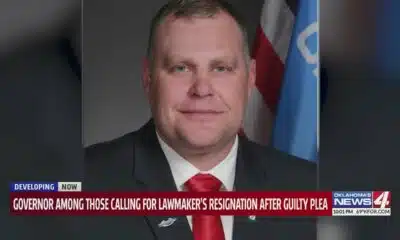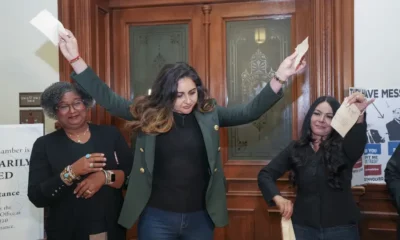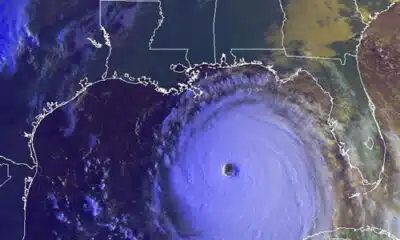News from the South - West Virginia News Feed
Morrisey says WV health won’t suffer with weakened vaccine laws. Experts disagree.
by Lori Kersey, West Virginia Watch
July 14, 2025
As the number of U.S. measles continues at a record high, West Virginia Gov. Patrick Morrisey has not backed down from his January executive order loosening the state’s strong school vaccine laws by allowing religious and philosophical exemptions for the shots.
At a news conference last month, Morrisey said his administration is not aware of “one shred of evidence” that the state allowing religious exemptions would have negative consequences on residents’ health.
“We’re not aware of one shred of evidence that by moving to be a state that respects religious liberty and exemption, that there is any negative public health effect,” Morrisey said June 24. “I dare the other side to provide that. They’re misleading you. We’re going to tell the truth.”
The executive order is based on the 2023 “Equal Protection for Religion Act.” Lawmakers this year voted down Senate Bill 460, which would have set the religious exemptions in state code. Morrisey maintains that the religious freedom law should give families the freedom not to vaccinate their kids if they choose to; he says his January executive order is merely an interpretation of that law.
Morrisey told a reporter that statistics show that in states that allow religious exemptions, the number of people who get religious exemptions for vaccines is not big enough to affect herd immunity, the resistance to infectious disease a community with a high rate of vaccination has.
But public health experts, including one of the state’s former health officers, disagree with the governor’s assertion. They say areas with looser school vaccine laws are more likely to have disease outbreaks.
“There is overwhelming evidence that vaccine exemption policies reduce vaccination coverage rates and increase the burden of vaccine-preventable diseases,” Richard Hughes, a George Washington University law professor and vaccine law expert, wrote in a statement to West Virginia Watch. He said Morrisey’s claim disregards “decades of public health research.”
Hughes pointed to a 2010 medical study in California that found that areas of high non-medical exemptions were 2.5 times more likely to have outbreaks of pertussis, also known as whooping cough, than those with lower non-medical exemptions.
Another analysis estimated that a state with easier nonmedical vaccine exemption procedures is nearly twice as likely to experience a measles outbreak compared with states with more difficult exemption policies.
“The public health evidence is clear: well-designed vaccine exemption policies can help protect child health by maintaining high immunization coverage, preventing outbreaks, and protecting vulnerable children who cannot be vaccinated for valid medical reasons,” Hughes said.
“This is not just about religious liberty. It’s about whether one official can unilaterally weaken a system that has long protected the health of all children in the state,” Hughes said.
West Virginia currently does not have a health officer. State Secretary of Health Arvin Singh appeared at the governor’s news conference and spoke in support of religious exemptions. Singh said that the executive order “ensures that people of faith are not punished for making personal, prayerful decisions about their children’s health.”
Singh, who has a Master of Science in health care leadership and a master’s degree in public health, said there’s not “meaningful evidence,” religious exemptions have led to an increase in disease incidence at the population level.
He pointed to Florida, Ohio and Pennsylvania as states that maintain 90% rates for school vaccinations while allowing religious exemptions.
Data from the Ohio Department of Health indicate that 86% of kindergarten kids got all their required shots in the 2023-2024 school year. In Florida, that number was 88% in the 2023 school year. Pennsylvania kindergarteners had a 94% vaccination rate for measles during the 2024-2025 school year.
A spokeswoman for the state Department of Health said Singh was referring to the Centers for Disease Control and Prevention’s elementary school data and clarified that he meant that Ohio and Florida were “nearly at the 90% immunization rate threshold.”
“West Virginia is a beautiful state filled with hard-working families who love their children, live their values and seek to do what’s right,” Singh said. “We should not be one of the only five states still denying parents their God-given right to make decisions of conscience.”
More than 140 non-medical exemptions approved so far
All states require school students to be vaccinated against a series of infectious diseases. West Virginia has been one of only five in the country that do not allow religious or philosophical exemptions to those vaccines.
As of last month, the state Department of Health said it had processed 140 religious exemptions for the 2025-2026 school year under Morrisey’s executive order. At 140, the number of exemptions would still be a tiny fraction of the total number of school age children in the state, estimated at more than 250,000.
By contrast, there were 53 requests for medical exemptions to school vaccine requirements made in 2023 — and only nine of those resulted in a permanent exemption.
Dr. Steven Eshenaur, health officer and executive director of the Kanawha-Charleston Health Department, said Morrisey’s belief that non-medical exemptions will not affect the state’s herd immunity is just an assumption. He and other experts have pointed to the state’s low rate for preschool vaccinations as evidence that many parents wouldn’t have their children vaccinated unless they’re required to.
According to 2021 data, the state has some of the lowest vaccination rates in the country for children who are below school age. That year, about 57% of West Virginia three-year-olds got all of the recommended vaccinations. In 2023, 74% of West Virginia’s young children were vaccinated, according to KFF.
However, 98% of the state’s kindergarten children were vaccinated for measles during the 2023-2024 school year — higher than the national average of about 93%. Health experts say the state’s school vaccination laws are the reason for the higher rate of kindergarten vaccination.
“West Virginia has one of the lowest preschool immunization rates in the country,” Eshenaur said. “If those parents don’t have to immunize their children [to enter kindergarten], we would be looking at a very large percentage of our children that are unimmunized or under immunized going into school.
“The assumption is that they will get immunized,” Eshenaur said. “The reality is that parents aren’t immunizing them now. So why would they if they don’t have to?”
Eshenaur, pointed to measles outbreaks in Ontario, Canada and in Texas, both of which allow religious exemptions. As of July 8, Texas reported 753 confirmed measles cases and two fatalities since late January. The Ontario outbreak has infected more than 2,000 people and killed an infant. Most of the cases are in those who are unvaccinated.
‘You can’t look at just the statewide rate’
According to the CDC, as of last week, the U.S. reported 1,288 measles cases this year, the highest number in 33 years.
West Virginia last year reported its first confirmed measles case in 15 years. Health experts at the time credited the state’s high vaccination rates as the reason the highly-infectious virus did not spread to others.
“We know that when a number of children utilize a religious exemption, that it does set up that particular community or area or higher risk of a measles outbreak in particular, given how infectious it is, and we have witnessed that over this past year right here in the United States,” Eshenaur said.
Dr. Cathy Slemp, who was the state health officer from 2002 to 2011 and again from 2018 to 2020, said the more nonmedical exemptions that are present in a community, the higher the risk of disease and outbreak, among the unvaccinated and in the broader community.
“… in general, the laxer the (nonmedical exemption) process, the more exemptions seen and the greater the disease risk,” she said.
“Even a few cases or a single preventable outbreak have public health impact to those families and to public health and health care system costs of investigation and care,” Slemp said.
Nonmedical exemptions tend to cluster, Slemp said. One town or one school may have a high number of exemptions, leading to pockets of the population that have lower vaccination rates.
“You can’t look at just the statewide rate,” Slemp said. “It would really depend on that community and that school to look at the rates. So when we just look at a statewide rate, it doesn’t tell us the risk of individual communities.”
The vaccination rate needed to achieve “herd immunity” varies by disease. Herd immunity for measles, for instance, requires a 95% vaccination rate.
Morrisey’s comments came during a news conference announcing his support of a lawsuit filed in Raleigh County against the West Virginia Board of Education. The board voted to defy the governor’s executive order and instruct county boards of education to allow only medical exemptions to vaccine requirements.
Slemp said the issue isn’t about having no evidence, but a question of what a society values.
“It’s a societal question of what freedoms we value most — individual parental choice or societal comfort knowing we’ve done the best we can to protect all, especially infants and others who don’t have the option of being protected by vaccines,” she said. “We’re not looking at a return to prevaccine day levels of disease, but we can’t say there’s no impact. “
YOU MAKE OUR WORK POSSIBLE.
West Virginia Watch is part of States Newsroom, a nonprofit news network supported by grants and a coalition of donors as a 501c(3) public charity. West Virginia Watch maintains editorial independence. Contact Editor Leann Ray for questions: info@westvirginiawatch.com.
The post Morrisey says WV health won’t suffer with weakened vaccine laws. Experts disagree. appeared first on westvirginiawatch.com
Note: The following A.I. based commentary is not part of the original article, reproduced above, but is offered in the hopes that it will promote greater media literacy and critical thinking, by making any potential bias more visible to the reader –Staff Editor.
Political Bias Rating: Center-Left
The article presents a perspective that is generally aligned with public health advocacy, emphasizing the risks of loosening vaccine mandates and highlighting expert opinions that challenge the governor’s support for religious exemptions. The language is critical of the executive order’s potential impact on community health, reflecting a bias favoring science-based vaccination policies and collective welfare over individual exemptions framed as religious liberty. While it reports the governor’s position fairly, the overall framing leans toward concern about public health consequences, a stance typically associated with center-left viewpoints that prioritize government intervention in health matters.
News from the South - West Virginia News Feed
Jay’s Evening Weather Friday 08/29/25
SUMMARY: Jay’s Evening Weather Friday 08/29/25: Tonight’s forecast for Oakill and Nicholas County looks pleasant for football Friday. Temperatures start around 70°F, dropping to the mid-60s by halftime and into the mid-50s by game’s end—bring a jacket or blanket. Traffic near New River Gorge Bridge is flowing well. Beckley reports 73°F with mostly cloudy skies and light north winds. Statewide temps range from 67°F in Wheeling to 82°F in Huntington. Dry air dominates, with only isolated showers expected Sunday mainly in southern Calfields and Pocahontas County. Overnight lows will be in the low 50s. The weekend starts dry, with rain chances increasing Sunday and Monday.
The week has been a dry one around southern West Virginia, but some showers and storms are in the forecast on Sunday and again toward the middle of next week.
FOR ALL THE LATEST, BE SURE TO FOLLOW US ON FACEBOOK AND TWITTER:
https://facebook.com/WOAYNewsWatch
https://twitter.com/WOAYNewsWatch
News from the South - West Virginia News Feed
Clay County Panthers face steep expectations in 2025
SUMMARY: The Clay County Panthers, fresh off a postseason appearance, face steep expectations in 2025. Led by an experienced head coach, the team looks to win over 20 games and advance deeper in the playoffs. Although their new turf field won’t be ready for week one, the Panthers are excited to be the first to play on it soon. Despite practicing at various locations, including a local baseball field and gym, the team remains motivated. Returning offensive linemen and a new quarterback have put in significant offseason work, fueling optimism for a strong and successful season ahead.
Out in Clay County, a team fresh off a post-season appearance is looking for more in 2025. FULL STORY: …
News from the South - West Virginia News Feed
Tribal radio stations wait on $9M pledged in congressional handshake deal
by Jennifer Shutt, West Virginia Watch
August 29, 2025
WASHINGTON — Tribal radio stations that are supposed to receive millions to fill the hole created when Congress eliminated funding for the Corporation for Public Broadcasting haven’t heard anything from the Trump administration about when it will send the money or how much in grants they’ll receive.
Unlike most government spending deals, the handshake agreement South Dakota Republican Sen. Mike Rounds negotiated with the White House budget director in exchange for Rounds’ vote on the rescissions bill wasn’t placed in the legislation, so it never became law.
Instead, Rounds is trusting the Trump administration to move $9.4 million in funding from an undisclosed account to more than two dozen tribal radio stations in rural areas of Alaska, Arizona, California, Colorado, Idaho, Minnesota, New Mexico, North Dakota, Oregon, South Dakota and Wisconsin that receive community service grants from the Corporation for Public Broadcasting.
But neither Rounds’ office, the Office of Management and Budget, nor the Bureau of Indian Affairs responded to emails from States Newsroom asking when the grants would be sent to those radio stations and whether the funding levels would be equal to what they currently receive.
Loris Taylor, president and CEO of Native Public Media, a network of more than 60 broadcast stations that’s headquartered in Arizona, said she’s written to Rounds and the Bureau of Indian Affairs about the handshake deal reached in July but hasn’t heard back.
“I can’t place my expectations on something that hasn’t been concretely shared with the stations,” Taylor said. “And so all I can say is that our expectations are to raise money for the stations to make sure that they have operational dollars for FY 2026, and that’s exactly where we’re placing our focus.”
Taylor pointed out that Rounds’ informal deal with White House budget director Russ Vought doesn’t cover all of the tribal stations in the network and will only last for one year, leaving questions about long-term budgeting.
An Interior Department spokesperson wrote in an email after this story originally published that “Indian Affairs has received a list of 37 stations and is working to distribute about $9.4 million in funding to support them.
“We know how important these stations are for public safety and are moving quickly to get the money out. Before we can set a timeline, we need to coordinate with the stations, tribes and other partners to ensure the funds are delivered efficiently and meet the needs of Indian Country. We will share updates when we have more to share publicly.”
The spokesperson did not provide a list of those stations or information on how the department plans to divvy up the funding.
‘The little stations like us’
Dave Patty, general manager at KIYU-FM in Galena, Alaska, said he isn’t planning to receive any federal funding during the upcoming fiscal year, in part because he hasn’t heard anything from the administration. The 2026 federal fiscal year begins on Oct. 1.
“Well, I certainly can’t budget anything that I don’t know is coming, so I’m definitely not planning for it now,” he said.
President Donald Trump and Republican lawmakers’ decision to eliminate all funding for the Corporation for Public Broadcasting because of their belief of left-leaning bias at National Public Radio wasn’t the right way to address those frustrations, Patty said.
“The narrative was definitely centered around NPR and that was definitely wrong because NPR aren’t the ones in trouble,” he said. “NPR is well funded from philanthropists all over the country, and as a mothership, NPR is not going anywhere. It’s the little stations like us that are going to go away because, for instance, about 60% of our budget came from the CPB grant.”
The Corporation for Public Broadcasting announced in early August it will shutter most of its operations by the end of September, with some staff working through January.
NPR and the Public Broadcasting Service have made no such announcements, but local stations throughout the country have announced budget cuts since Congress approved the bill rescinding $1.1 billion in funding it previously approved for CPB. That money was supposed to cover costs during fiscal 2026 and 2027.
Lawsuit feared
Karl Habeck, general manager at WOJB in Hayward, Wisconsin, said he’s only heard “gossip” and “rumors” about how exactly the handshake agreement will work in practice but is concerned that someone may challenge the Trump administration’s authority to move money around since it wasn’t in the bill and never became law.
“What gives them the right to take these funds that were allocated for environmental projects and send them towards Native American radio stations?” Habeck said.
Typically, the administration would need sign-off from appropriators in Congress before moving large sums of money from one account to another.
Officials haven’t said publicly where exactly they plan on taking the money from and it’s unclear if the Trump administration is trying to create a new account for grants to rural tribal radio stations out of thin air, without an actual appropriation from Congress.
Alaska Republican Sen. Lisa Murkowski, chairwoman of the Interior-Environment Appropriations Subcommittee, and Oregon Democratic Sen. Jeff Merkley, ranking member on the panel, didn’t immediately respond to a request for details.
Habeck said he expects WOJB will be okay financially for the next year, but that he and many others don’t know what the future will hold after that.
“It’s going to be hard,” Habeck said. “I guess people don’t understand. You know, they try to compare us to commercial radio and it’s two different things.”
Local broadcasting stations, he said, have fewer employees and are often a nexus for their communities, providing information about everything from lost dogs to emergency alerts to high school sports updates.
“That doesn’t happen everywhere. It’d be a shame to lose that,” Habeck said. “I think we’re an integral part of the community and people have come to rely on us and appreciate that. And I’m talking everybody. I don’t care what their political stance is. “
A different mission for tribal radio stations
Sue Matters, station manager at KWSO in Warm Springs, Oregon, said she reached out to one of her home-state senators, Ron Wyden, who contacted Rounds’ office to ask how the funding would be allocated and when. But Wyden was unable to share any concrete information.
Matters also spoke with someone she knows at the Bureau of Indian Affairs, who was similarly unable to provide information about how the agreement will actually work.
“I’m just assuming there’s not anything,” Matters said, adding she’s now focusing on securing a grant from the bridge fund that’s supposed to help the more at-risk public broadcasting stations.
Tribal stations, she said, often have substantially different missions than commercial stations, focusing on language and cultural programs as well as preserving their traditional life.
“That’s endangered,” Matters said. “We won’t let anything stop us. But it’s sad that for whatever reason this funding has been taken away.”
West Virginia Watch is part of States Newsroom, a nonprofit news network supported by grants and a coalition of donors as a 501c(3) public charity. West Virginia Watch maintains editorial independence. Contact Editor Leann Ray for questions: info@westvirginiawatch.com.
The post Tribal radio stations wait on $9M pledged in congressional handshake deal appeared first on westvirginiawatch.com
Note: The following A.I. based commentary is not part of the original article, reproduced above, but is offered in the hopes that it will promote greater media literacy and critical thinking, by making any potential bias more visible to the reader –Staff Editor.
Political Bias Rating: Center-Left
This content primarily focuses on the challenges faced by tribal radio stations due to funding cuts and uncertainties under a Trump-era Republican administration. It highlights criticism of the Trump administration’s handling of the Corporation for Public Broadcasting funding and emphasizes the negative impacts on vulnerable local and tribal communities. The article underscores the perceived inadequacies and lack of transparency in Republican-led funding decisions, with quotes reflecting concern about the consequences of defunding public media. The tone is critical of Republican actions while supportive of public and tribal media, which is characteristic of a center-left perspective. However, it remains factual and does not delve into broader partisan rhetoric, maintaining some level of balance and avoiding far-left ideological framing.
-
News from the South - Texas News Feed5 days ago
Racism Wrapped in Rural Warmth
-
News from the South - Texas News Feed7 days ago
DEA agents uncover 'torture chamber,' buried drugs and bones at Kentucky home
-
News from the South - Missouri News Feed6 days ago
Donors to private school voucher program removed from Missouri transparency site
-
News from the South - Tennessee News Feed2 days ago
New developments in Pauline Pusser case
-
News from the South - Florida News Feed7 days ago
Ukraine’s independence-era voices say Russia’s effort to keep control has lasted decades
-
News from the South - Texas News Feed6 days ago
Texas Democrats’ walkout prompts GOP retribution
-
News from the South - Alabama News Feed5 days ago
Child in north Alabama has measles, says Alabama Department of Public Health
-
Our Mississippi Home5 days ago
After the Winds: Kindness in Katrina’s Wake










































